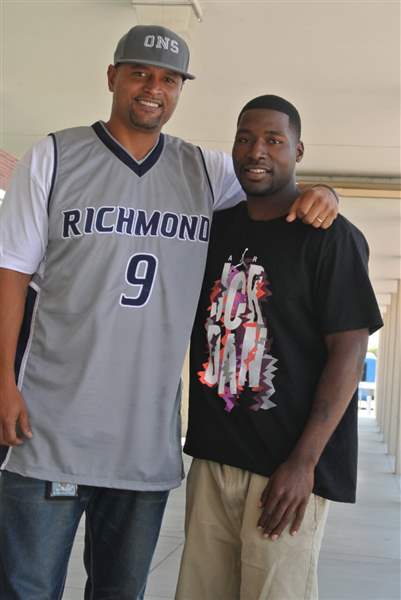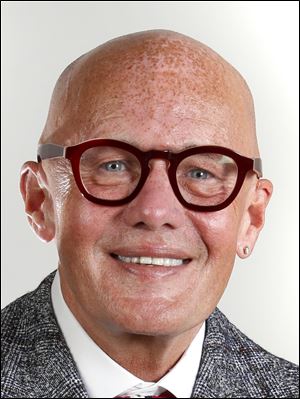
COMMENTARY
Young offenders need a say in Toledo’s Operation Peacemaker
9/13/2015
Eric Welch, right, with an Operation Peacemaker worker in Richmond, Calif., finished his fellowship in the program in 2013 and is starting as a student of public policy and juvenile justice at Florida A&M University.
The Blade/Jeff Gerritt
Buy This Image
Toledo’s shotcallers will meet this week to decide whether to move forward with a local version of Operation Peacemaker, a highly effective but controversial anti-gun violence program that originated in Richmond, Calif.

Gerritt
Around a 911 center conference table will sit people with titles such as judge, sheriff, police chief, mayor — and degrees, such as bachelor’s, master’s, and law.
Still, this distinguished group won’t be complete without a few young cats without degrees or titles, and little on their records and resumés besides a felony. Creating anything similar to Operation Peacemaker here will require new attitudes that include viewing some of the people whom the community has feared, demonized, and labeled thugs as partners in peace.
“They’re the experts,” Jacob Spellis, 23, of Toledo, a board member of the Reentry Coalition of Northwest Ohio, told me Friday. “What they know can’t be found in text books.”
Spellis should know. Formerly locked up for drug trafficking, he’s now studying for a master’s degree in social work.
Young offenders — possibly newly released from prison — who want to contribute to an anti-gun violence program like Operation Peacemaker should not be hard to find. Lucas County Sheriff John Tharp, who called this week’s meeting and leads local planning efforts, could invite them to this week’s meeting through the Reentry Coalition, the Ridge Project, or other organizations that work with ex-prisoners and offenders. Some of these men might also make good street outreach workers when, and if, the program launches in Toledo.
Operation Peacemaker’s founder, DeVone Boggan, who visited Toledo this month, has credited his former shooters for cutting Richmond's homicides and firearms assaults by half. Last year, three years after Operation Peacemaker started, the city enjoyed the fewest number of homicides in more than 40 years.
“These young men — not us — are responsible for reducing gun violence in Richmond,” Mr. Boggan told me last month in Richmond, a working-class and increasingly impoverished city 17 miles northeast of San Francisco. “They have to make daily decisions to negotiate terrible conflicts that may be generations old. Their voices need to be part of the equation.”

Eric Welch, right, with an Operation Peacemaker worker in Richmond, Calif., finished his fellowship in the program in 2013 and is starting as a student of public policy and juvenile justice at Florida A&M University.
In Richmond, outreach workers, many of them ex-prisoners who are still respected on the street, help identify the small number of young men, ages 15 to 25, who are doing most of the shooting. (In Toledo, there might be 25 to 40 serious shooters.)
After outreach workers identify them and gain their trust, they enroll them in an 18-month fellowship. The fellowship includes intense mentoring, travel inside and out of the country, and cash incentives — stipends — to finish life plan goals, such as earning a GED, finishing high school, finding and holding a job, getting a driver’s license, saving money in a bank account, and staying out of trouble.
In July, an evaluation released by the National Council on Crime and Delinquency, tracking 68 fellows from 2010 to 2014, found that nearly 80 percent had not been suspected of a gun-related crime since becoming a fellow. Street conflicts, some of them rooted in decades-old beefs, continued in Richmond, but the fellows handled them in nonviolent ways.
Private donors and foundations pay for the stipends, typically $300 to $700 a month, as well as for travel and other activities. Toledo could seek assistance from foundations such as Draper Richards Kaplan in Palo Alto, California. But local donors should step up too. So far this year in Toledo, shootings are up 40 percent, to 364 from 259, Lt. Joseph Heffernan of the Toledo Police Department told me.
Participation in Operation Peacemaker doesn’t shield fellows from prosecution, if new evidence on their cases surfaces.Even facing the possibility of prison, most of these young men grow in amazing ways. Guys who were, six months earlier, trying to kill each other perform public service projects together in cities and countries they never dreamed of seeing, including Mexico and South Africa.
In Richmond, I met Eric Welch, a graduate of the fellowship who was locked up on gun and street terrorism charges five years ago. Now 26, he’s studying public policy and juvenile justice at Florida A&M University.
Returning to Toledo, I ran into Eric at the Oakland Airport, where he was catching a flight to Florida. He was already missing his mother but excited about starting school. Eric was a different person than the notorious shooter he was before the fellowship — or maybe the same person who had an opportunity to change and took it.
Eric told me he wanted to come to Toledo to help set up a program like Operation Peacemaker. I wish he could help guide the discussion in Toledo this week.
But there are many young men in this city like him who could show that they’re not only part of the problem but also the solution.
Jeff Gerritt is deputy editorial page editor of The Blade.
Contact him at: jgerritt@theblade.com or 419-724-6467. Follow him on twitter@jeffgerritt.